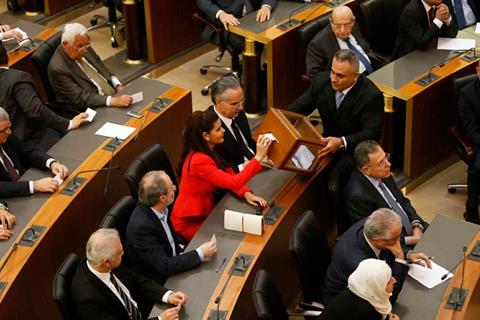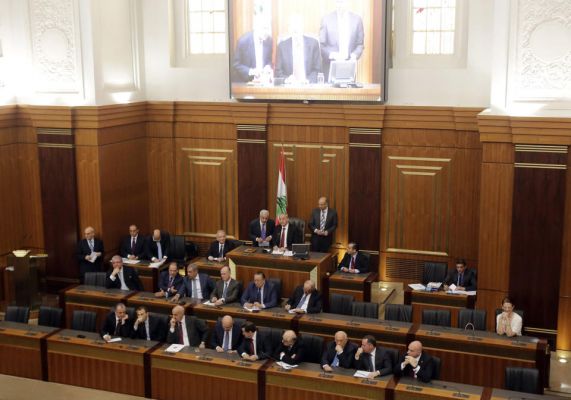BEIRUT (Reuters) - Lebanese parliamentarians failed to elect a new president in a first round of voting on Wednesday, with leading candidate Samir Geagea falling well short of the required two-thirds majority.
Geagea's shortfall had been widely expected and is likely to open up the race to other candidates in a process which politicians have warned could drag on for months.
The parliamentary session began at noon on Wednesday. No candidate succeeded in getting the minimum 86 votes, or a two-thirds majority, needed to win the presidency.
All the MPs filed out after the ballots were counted, preventing a quorum for a second round of voting. According to the Lebanese constitution, a candidate needs only 51 per cent of votes in the second round to win the presidency. The next session to elect a president will be held on April 30.
The election was the first opportunity to produce a president without the influence of Syrian authorities, since Syria ended its nearly 30-year military presence in Lebanon in 2005.
Christians and Muslims have equal representation in parliament, and a power-sharing agreement dictates that the president must be a Maronite Christian.
Parliament must choose a successor to President Michel Suleiman, whose six-year term ends in late May. But deep political divisions within the country and over the war in neighboring Syria have hampered efforts to agree on a new president, who must be a Maronite Christian.
Geagea, supported by the March 14 political bloc which opposes Syrian President Bashar al-Assad, won 48 votes in a session attended by 124 parliamentarians.
His total was eclipsed by 52 blank votes submitted by members of the March 8 coalition,
A second candidate, Henri Helou, who is backed by members of a small bloc of independents and centrists, won 16 votes.
One vote was submitted for former president Amine Gemayel, and seven votes were deemed void.
LF MP Strida Geagea criticized the blank ballots, saying she had hoped that a name of a strong candidate would have been put forward instead.
“It would have been better if a clear candidate was running against us ... they should have voted for a strong candidate,” Geagea told reporters following the session.
“A strong candidate would have been someone like [former] General Michel Aoun,” she added.
Geagea also commented on some of the ballots that included the names of figures killed during the war whose relatives accuse the LF leader of their murder, including Dany Chamoun and Rashid Karami.
“This is irresponsible behavior and political bankruptcy ... we know how they died and who was responsible for that,” said Geagea, who maintains her husband's innocence.
The void ballots carried the names of former Prime Minister Rashid Karami, who was killed in a car bomb in 1978, Dani Chamoun and his son, Tareq, who were both killed in 1990 when Tareq was just seven, Jihan Franjieh, the daughter of Tony Franjieh who was killed in 1978, and Elias Zayek who was slain in the 1980s.
Presidential hopeful Helou, Jumblatt’s nominee, also vowed to continue with the presidential campaign until the end, saying “the most important thing is to help safeguard the country through an all-inclusive dialogue.”
Since there is no formal process to declare someone a candidate, the ballot is essentially an open field. MPs can write down anyone's name, or even submit blank ballots. New candidates may also come forward between the first and second voting rounds.
"Things could develop fairly quickly [today] to either bring certain names to the fore or distance certain names from running, and that needs to be closely watched," said Habib Malik, associate professor of history at the Lebanese American University. Lawmakers must pick a replacement for President Michel Sleiman before his term ends of May 25, but the political class remains deeply divided over the issue of Hezbollah's arsenal and the war in neighbouring Syria.
If parliament fails to elect a new president in the second session, politicians might look for consensus candidates such as current army chief General Jean Kahwaji or Central Bank governor Riad Salameh, though neither has declared their intention to run at this stage. Lebanon's political system divides up political power among its various religious communities, allocating the presidency to Maronite Christians. The prime minister is a Sunni Muslim and the speaker of parliament a Shi'te Muslim. (Reporting by Dominic Evans; Editing by Hugh Lawson)
Lebanese parliament speaker Nabih Berri casts his vote to elect the new Lebanese president in the parliament building in downtown Beirut April 23, 2014. Lebanese parliamentarians failed to elect a new president in a first round of voting on Wednesday, with leading candidate Samir Geagea falling well short of the required two-thirds majority. REUTERS/Joseph Eid/Pool
ebanese Prime Minister Tammam Salam (C) casts his vote to elect the new Lebanese president in the parliament building in downtown Beirut April 23, 2014. Lebanese parliamentarians failed to elect a new president in a first round of voting on Wednesday, with leading candidate Samir Geagea falling well short of the required two-thirds majority. REUTERS/Joseph Eid/Pool (LEBANON - Tags: POLITICS ELECTIONS)
Lebanese members of parliament parliament gather to elect the new president in downtown Beirut on Wednesday, April 23, 2014

